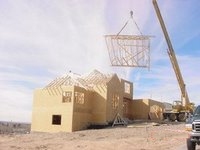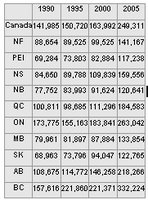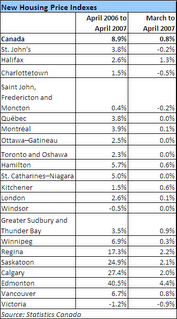
How Canada’s executive homes rank with others around the world
A new survey by Century 21 Canada says that executives working in the
downtown business districts of Canada’s hottest real estate markets,
such as Vancouver and Calgary, experience house prices and daily
commute times that rank with those in the world’s major financial
centres of London, England, New York, Paris and Seoul.
The survey of typical house prices was conducted by Century 21 Canada
in 15 cities in Canada and in 16 cities around the world.
In Canada’s regional hub cities, such as Halifax, Winnipeg and
Saskatoon, executives working downtown face house prices and daily
commute times that rank with the world’s least expensive capital
cities such Moscow, Singapore and Istanbul.
In between are Toronto, Montreal, Ottawa, Quebec City and Victoria,
where executive prices and daily commute times compare with Tokyo,
Taipei and Mexico City.
Don Lawby, president of Century 21 Canada, says, “Whether executive
house prices are at the high or low end of the range, in Canada or
elsewhere in the world, depends on the current state of the local
economies – and our survey reflects that Vancouver and Calgary are
booming whether you compare them to cities in the rest of Canada or to
cities around the world.”
He says Canadian cities at every price level have benefits that can’t
be measured in dollars or commuting time.
“All things considered, Canadian cities offer among the best living
and working conditions in the world. We have low levels of population
congestion, we breathe fresh air, nature is at our doorstep, and we
have few security problems. You can’t say these things of many other
major cities in the world, which might have stifling heat or humidity,
crushing congestion, or choking pollution.
“Our three largest cities – Toronto, Montreal and Vancouver – are as
cosmopolitan as any cities in the world. We can sample and enjoy
nearly all the major cultures of the world right here,” says Lawby.
The homes selected for inclusion in the Century 21 survey are based on
the knowledge and experience of Century 21 brokers in each of the 31
cities around the world. Their selections are representative of the
typical homes chosen by executives who work in the downtown core in
each of the cities.
The survey found that the 10 most expensive housing markets for
executive home buyers working in the downtown business districts are
London, England, $5.68-million; New York, $2.5-million;
Vancouver, $1.55-million; Sydney, Australia, $1.4-million; Paris,
$1.39-million; Seoul, $1.25-million; Calgary, $1.2-million; Nicosia,
$1-million; Toronto, $890,000; and Victoria, $850,000.
The 10 least expensive markets are Moncton, $249,900; Singapore,
$304,135; London, Canada, $325,000; Bogota, $368,852; St. John’s,
$379,000; Charlottetown, $379,000; Saskatoon, $429,000; Winnipeg,
$450,000; Istanbul, $471,927; and Edmonton, $489,900.
“Another way to view the survey results and to provide another
observation into the lifestyle of executives around the world is to
compare the price to the size of the home,” says Lawby.
“This shows that markets where homes are traditionally smaller – such
as Taipei and Tokyo – move toward the top of the list, while Toronto,
Victoria and others fall from the top 10,” says Lawby.
When comparing prices to sizes of the homes, the Century 21 survey
found that the 10 most expensive housing markets in the world for
executive home buyers working in the downtown business districts per
square foot are London, England, $3,156; Paris, $1,163; Seoul, $1,097;
Calgary, $800; Sydney, Australia, $722; Taipei, $613; Vancouver, $574;
Athens, $491; New York, $480; and Tokyo, $385.
The 10 least expensive markets per square foot are Mexico City, $75;
London, Canada, $98; St. John’s, $105; Moncton, $119; Halifax, $125;
Bogota, $137; Charlottetown, $146; Quebec, $147 Winnipeg, $150; and
Johannesburg, $163.
Some examples of typical executive homes from the Century 21 study:
In Toronto, a typical executive choice would be a four-bedroom,
five-bath 3,200-square-foot home on a 7,500-square-foot lot near Yonge
Street and Steeles Avenue, priced at $890,000 and a 45-minute drive to
the Bay Street financial district.
In Montreal, a typical executive choice would be a three-bedroom,
two-bath 2,000-square-foot home on a 19,656-square-foot lot on a golf
course at Blainville, priced at $589,000 and 40-minute commute to
downtown by train or car.
In Vancouver, a typical executive choice would be a four-bedroom, 2 ½
bath 2,700-square-foot home on an 8,750-square-foot-lot in
Ambleside-By-The-Sea in West Vancouver, priced at $1.55 million and a
30-minute commute across the Lion’s GateBridge to downtown Vancouver.
In Calgary, a typical executive choice would be a three-bedroom,
three-bath 1,500-square-foot home on a 6,250-square-foot-lot in
Roxboro, priced at $1.2 million and a 25-minute drive to the downtown
business core and the CalgaryTower.
In Winnipeg, a typical executive choice would be a four-bedroom, 3 ½
bath 3,000-square-foot home on a 9,000-square-foot lot in Tuxedo,
priced at $450,000 and a 15-minute drive to Portage Avenue and Main
Street, the downtown focal point.
In Halifax, a typical executive choice would be a four-bedroom,
three-bath, 4,000-square-foot home on a one-acre country lot in
Kingswood, priced at $500,000 and a 30-minute drive to the downtown or
to Citadel Hill, the national historic site overlooking the harbour.
In New York, a typical executive choice would be a five-bedroom,
five-bath 5,200-square-foot home on a 20,878-square-foot lot, priced
at $2.5 million in RoslynHeights, Long Island, and 45 minutes to the
Wall Street financial district by subway or car.
In London, England, a typical executive choice would be a two-bedroom,
two-bath, 1,800-square-foot penthouse apartment in fashionable Notting
Hill, priced at $5.68 million, a 30-minute drive to the financial
district and a 15-minute stroll to KensingtonPalace and Gardens.
In Paris, a typical executive choice would be a three-bedroom,
one-bath 1,195-square-foot duplex apartment in the city centre, priced
at $1.39 million and a three-minute walk from the Sacré Cœur Basilica.
In Seoul, a typical executive choice would be a four-bedroom,
two-bath, 1,139-square-foot apartment in Gangman district on the south
side of the HangangRiver, priced at $1.25 million and a 30-minute
commute to the business core.
In Sydney, Australia, a typical executive choice would be a
three-bedroom, two-bath 1,938-square-foot penthouse apartment in
Pagewood, priced at $1.4 million, 20 minutes from the downtown and 15
minutes from the Sydney Opera House.
In Tokyo, a typical executive choice would be a four-bedroom, two-bath
1,722-square-foot home on a 1,884-square-foot lot at YokohamaCity,
priced at $663,109 and 45 minutes by train to downtown Tokyo.
Read more about
Toronto Prices
For more information please contact A. Mark Argentino
A. Mark Argentino, Broker, P.Eng.,
Specializing in Residential & Investment Real Estate
RE/MAX Realty Specialists Inc., Brokerage
2691 Credit Valley Road, Suite 101, Mississauga, Ontario L5M 7A1
BUS. 905-828-3434
FAX. 905-828-2829
E-MAIL:
mark@mississauga4sale.comWebsite:
Mississauga4Sale.com




















